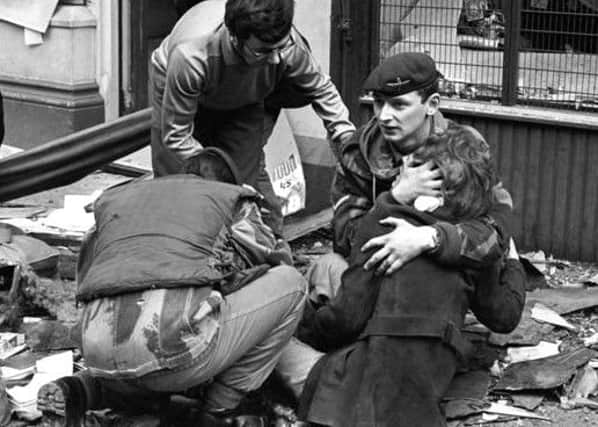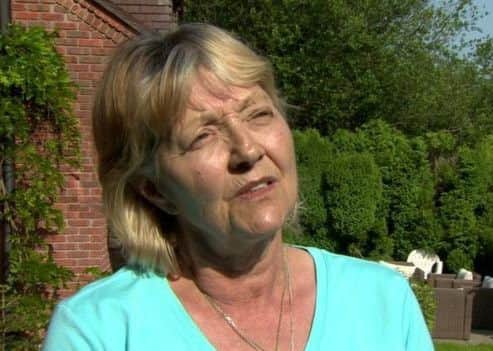Bomb survivor trying to track down soldier


Blanka Seuhiro (nee Sochor) was a 22-year-old student who was in Donegall Street on March 20, 1972 fetching materials for a project when a car bomb detonated outside the News Letter office, killing seven people.
In an interview with the BBC News NI, Ms Suehiro said the soldier and another man had given her first aid and comforted her until medics arrived.
Advertisement
Hide AdAdvertisement
Hide AdIn an Associated Press photo of her with the soldier, he appears to be wearing a beret bearing the emblem of The Parachute Regiment who had several tours of duty in Northern Ireland between 1969 and 2002.


Ms Suehiro had fled Czechoslovakia to study in Northern Ireland in 1969, a year after the Prague Spring uprising.
Of the PIRA bomb in which she nearly lost her legs, she said: “I don’t remember hearing the bomb, I don’t remember flying through the air. I just remember waking up in horrible pain and not really knowing what was going on. It was 200lbs of gelignite in a narrow street. It was mayhem everywhere.”
The PIRA had given several warnings before the bomb exploded, however it has been widely claimed the warnings were deliberately misleading.
Advertisement
Hide AdAdvertisement
Hide AdThe bomb went off outside the News Letter office in Donegall Street where shoppers had been evacuated to, thinking the bomb was in nearby Church Street. Nearly 150 people were injured and seven were killed including two RUC officers and an off duty UDR man.
After the explosion, Ms Seuhiro spent a year in the Royal Victoria Hospital: “All I kept thinking was, ‘please don’t cut my legs off’. I was very sporty, that was so important to me.”
Over the year that followed, plastic surgeons were able to save her legs. She said she has vivid memories of a soldier and another man who gave her first aid at the scene: “They were just talking to me, holding my hand, putting pressure on the wounds, which were mainly on my leg. Just being there for me, even though they didn’t know if there were snipers or other bombs about to explode.
“People were saying to run away, but they didn’t – they basically risked their lives for mine.”
Advertisement
Hide AdAdvertisement
Hide AdMs Suehiro said hospital staff told her the soldier who helped came to visit her while she was there, but she has no recollection of this: “That’s why I’d like to track him down now - to tell him how grateful I am for what he did. To say thank you so much for coming to visit me and being a very kind soul.”
In 1975, Ms Suehiro left NI for Canada. It was during her return to the Province this week that she opened up about her experience 47 years ago: “The hard part was that I couldn’t be in touch with my family because I was illegally out of Czechoslovakia, there was the Russian occupation. But I do remember the staff at the hospital being so kind and letting me call my mum.”
Her mother had feared the worst when a picture of her daughter being comforted by the soldier had appeared in a Czech newspaper.
Commenting on her experience, she said: “In a way, it was good for me, because I learned at such a young age how precious life is. And how, despite all the people in the world who have hate in their hearts, there are so many more who have only kindness.
“I wouldn’t know where to start to find this soldier, but I hope I can.”